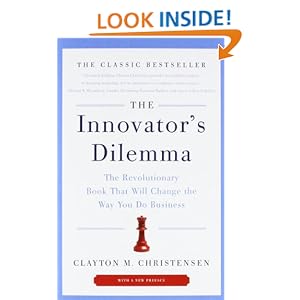Basic premise is not really that new and is pretty straight forward . . . "We cannot solve our problems with the same thinking we used when we created them." Einstein
In other words, the very business practices that make a company a success and enable it to grow are the ones that limit its ability to develop and sustain a new disruptive technology. Therefore, if a company is interested in maintaining its current scale and success as well as engage in developing new disruptive technologies it will need to to do so by acquiring or spinning out a small, flexible, independent, organization who's sole purpose is to focus on the disruptive technology and who's small scale matches the small scale of the new markets that will be "early adopters" of the new disruptive technology.
The three elements of a business: Values --> Processes --> Resources are very different in large, successful, established organizations that focus on incremental change vs. small, entrepreneurial organizations that focus on disruptive change.

